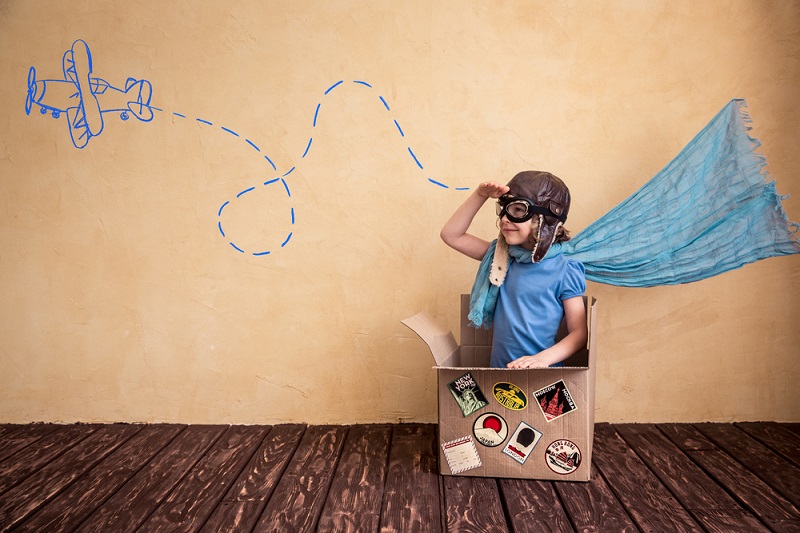Creativity is a form of self-expression and we need to find ways to understand how to develop creativity in children. When children are able to express themselves freely and without being judged, they are most likely to be very happy and that in turn also enhances child creativity. Creativity is less of an inborn talent and more of a skill. It is an ability which both parents and teachers can facilitate among the children by giving them an outlet to unleash child creativity. Most of us think that child creativity is an inborn talent which means, either the child has it or they do not. This is a very common misconception. It might just surprise you as a parent that the child’s perception is often way more creative than you think. They might just come up with some innovative ideas or concepts to make the world more advanced than any adult would ever think of. Child creativity development is necessary and plays a vital role in shaping their life. We should start thinking along the lines of encouraging creativity at home by coming up with innovative and fun ways to provide kids with creative things to learn.
Here are some tips that we think might help you to understand how to develop creativity in your child and enhance child creativity in a fun way
- Drawing and Painting: Encourage your child to express themselves through drawing and painting. You can give them different types of art materials and creative things to learn and explore like watercolours, paintbrushes, crayons and markers. Let them be free to unleash their imagination and do whatever they want to on the blank page. Make sure you are not an interrupter but just an observer and watch them without any restrictions or corrections.
- Reading for pleasure: Limit TV or other screen time for your children to make room for creative hobbies like reading as it encourages thought activity which in turn promotes creativity. Reading has the ability to help your child understand and express better, develop their logical thinking, and help them to focus on learning new things. You can frequently take them to visit the library or a bookstore and discuss with them about their favourite author or book and its characters. This will help you get an idea about their thought process.
- Building Blocks: Encourage your child to build and create with blocks. To aid child creativity development, provide them with different types of blocks such as wooden blocks, Legos, and Jenga. This is a powerful way to build a child’s skills. Children thrive in their skills development by using creative block activities in play. They often have new ideas for things they want to build after a few iterations.
- Imaginary Play: Encourage your child to use their imagination through role-playing as this can be one of the most creative things to learn. Provide them with costumes and props to enhance their play. They can involve themselves in imaginative play with others or alone. Examples of imaginative play can include pretending to cook, clean, save the world, beat bad guys, capture dragons and extinguish fires, act like a teacher or doctor, host exceptionally dignified dinner parties or become the mayors of cities.
- Music: Encourage your child to explore music by playing, listening, singing, and dancing. You can give them musical instruments that might interest them like a guitar, piano, violin, or drum set. Help them enjoy the kind of music they like so they will eventually be able to relate music to their lives and broaden their musical horizons.
- Cooking: Encourage your child to help you in the kitchen to boost their creativity at home. Teach them how to measure and mix ingredients and let them be creative with their own recipes. This can help young kids build language skills as well as learn and practice some basic math concepts. Preparing meals together with your kids will also boost their self-confidence and lay a foundation for healthy eating habits.
- Nature Walks: Encourage your child to explore nature by going on walks and hikes. Tell them about different plants and animals and encourage them to create their own stories or drawings inspired by what they see. Give them time to explore nature and pay attention to see if they are fascinated by something. Exploring nature helps them notice different things and observe with all their senses. They also learn to focus their attention and grab the details of different things around them.
- Photography: Encourage your child to take pictures of their surroundings to boost child creativity development. Provide them with a camera or a smartphone and let them capture their own unique perspective. Photography allows children to explore different things and express themselves by capturing the beauty in whatever they see around them. Help them explore their creative imagination and build on how they see the world.
- Science Experiments: Encourage your child to explore science by doing simple experiments at home. Teach them about cause and effect and let them create their own experiments by boosting their creativity at home. This will help them build their curiosity about the things they see around them. Experiments can be used to clarify any puzzling topic that the child is struggling with and it also helps to introduce them to new ideas and concepts.
- Board Games: Encourage your child to play board games that require creativity and imagination, such as storytelling games or games that involve building and creating. Research suggests that there are many popular board games that can help children develop skills like problem-solving, decision-making and dealing with mistakes at an early age.
We at EuroSchool understand that creativity is a significant component and the main focus of organizations in any field and the key to success in nearly everything we do. Hence it becomes important to foster such a kind of thinking in children from their early years and nourish child creativity. We focus on how to develop creativity in children and know that we cannot limit creativity to just artistic and musical expression. Creativity is also essential for science, mathematics, linguistics, naturalism and even social and emotional intelligence. To conclude, we can say that being creative allows one to be more flexible and emerge as a better problem solver. It also makes them more confident in terms of adapting to changes around them and grabbing the new opportunities that may come their way.









